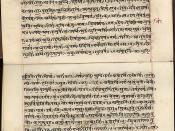"Hinduism"ÃÂ: Indigenous India and the Aryan Invasion Unlike Christianity, Islam, or Buddhism, Hinduism has no kind of unified worship or founder. "Hinduism"ÃÂ refers to all religious beliefs and philosophies of early India. Throughout history "Hinduism"ÃÂ has changed and evolved in many ways. Perhaps the most influential event or happening was the invasion of the Aryan people which has had a dominant and lasting impact that defines modern Hinduism and India.
The early Indian civilization started around 3000 BC in the Indus valley and was bordered by the Himalayas to the north. This location allowed the civilization to flourish on its own, untouched by other civilizations to the north. The early Indian civilization was composed of many different tribes who each had their own customs and beliefs. They were dominantly darker skinned and spoke different Dravidian languages. Having a very developed system of agriculture, farming crops and animals was the main source of industry.
The tools they used were made of stone. From the remains found, it is clear that Mother Earth or Shiva was worshiped, requiring sacrifices for a more prosperous harvest.
Around 2000 BC, the Aryan tribes invaded these peaceful people. They were of lighter skin and nomadic, resulting in them to be highly trained for battle. They had horses and chariots, which to that point had not been known to the Indus region. As the Aryan people began to settle in the northern part of the Indus valley, they slowly began to adapt agricultural methods, giving up their pastoral lifestyles. The migration of the Aryans triggered the Bronze Age for the Indus valley. Improved technology made life easier for Dasas, or darker skinned people.
Although there were improvements in technology and economics, the Aryans also brought in a system of belief that was very different to what the...


